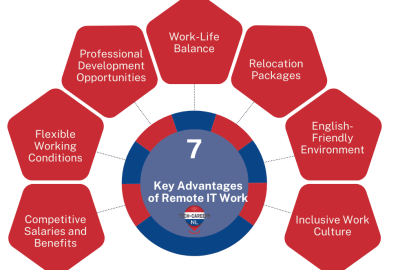
The landscape of remote work in the Netherlands has changed dramatically in recent years, especially in the tech industry. More companies are embracing flexibility, allowing talented professionals to work from anywhere. For those seeking IT jobs in Netherlands, the rise of remote positions offers a wealth of opportunities. This guide will help you understand how to navigate the market, enhance your skills, and secure a high-paying role, regardless of where you are located.
Understanding the Landscape: The Boom of Remote IT Jobs
Remote Work in the Netherlands: An Evolving Norm
The concept of remote work in the Netherlands has been gaining momentum, especially in the tech sector. With its robust digital infrastructure, high internet penetration, and progressive work culture, the Netherlands is a fertile ground for remote work. Major cities like Amsterdam, Rotterdam, and Utrecht are home to numerous tech companies that are increasingly open to hiring remote talent.
Moreover, many Dutch companies are adopting hybrid or fully remote models to attract a diverse pool of candidates. They recognize that allowing employees to work remotely increases job satisfaction and retention rates. As a result, there are growing opportunities for remote jobs in the Netherlands in areas like software development, data science, cybersecurity, and more.
The Netherlands’ favorable legal framework for remote work also plays a significant role. Employees in the Netherlands have the right to request remote working arrangements, and many employers are inclined to accommodate these requests. For IT professionals, this means a broader choice of employers and roles, from established companies to dynamic startups.
Why Choose Remote IT Work in the Netherlands?
Opting for remote jobs in the Netherlands for foreigners is not just about convenience; it’s a strategic career move. The Dutch tech sector is vibrant, offering competitive salaries and excellent benefits. With numerous multinational corporations and innovative startups based in the Netherlands, there is a high demand for IT professionals, from software developers to data analysts. These positions often come with attractive perks like flexible working hours, professional development opportunities, and even relocation packages for those willing to move.
Another reason to consider remote IT work in the Netherlands is the work-life balance. The Dutch culture emphasizes a healthy work-life balance, making it an ideal environment for remote work. Employers prioritize the well-being of their employees, and many offer additional benefits, such as mental health support, gym memberships, and generous vacation policies.
Additionally, the Netherlands is one of the most English-friendly countries in Europe, making it easier for non-Dutch speakers to find remote jobs in the Netherlands. Many companies operate in English, especially in the tech industry, further broadening the opportunities for international candidates.
Key Advantages of Remote IT Work in the Netherlands:
- Competitive Salaries and Benefits: The Dutch tech industry offers some of the most attractive compensation packages in Europe, including competitive salaries, bonuses, and benefits like health insurance and retirement plans.
- Flexible Working Conditions: Many Dutch companies provide flexible working hours, enabling professionals to create a schedule that suits their personal and professional needs.
- Professional Development Opportunities: Organizations often invest in the continuous learning of their employees, offering training programs, workshops, and courses to enhance skills and career growth.
- Work-Life Balance: Dutch employers value a balanced work-life approach, often offering generous vacation days, mental health support, and family-friendly policies.
- Relocation Packages: Some companies provide relocation assistance for those willing to move, covering expenses such as travel, accommodation, and settling-in support.
- English-Friendly Environment: With a high proficiency in English, the Netherlands provides a conducive environment for non-Dutch speakers, especially in tech roles where English is often the working language.
- Inclusive Work Culture: The Netherlands is known for its inclusive and diverse work culture, which encourages collaboration and innovation, making it an appealing destination for international professionals.

The Best IT Jobs for Remote Work
When considering remote work in tech, certain roles stand out due to their demand and the flexibility they offer. Positions such as software engineers, cloud architects, data scientists, and cybersecurity specialists are among the best IT jobs for remote work. These roles not only provide high salaries but also allow professionals to work independently, making them perfect for remote setups.
Tech companies in the Netherlands, such as Booking.com, Adyen, and TomTom, are known for offering remote jobs in the Netherlands. They have adopted remote-first policies or hybrid work models, allowing employees to choose where they work best. Moreover, many smaller tech firms and startups are entirely remote, providing further opportunities for IT professionals looking for flexibility.
For those interested in expanding their skills, companies like Philips and ASML offer remote IT jobs with a focus on innovation and cutting-edge technology. These companies provide an excellent environment for continuous learning and professional growth, making them ideal choices for tech enthusiasts.
Navigating the Job Market: Strategies for Success
Landing a high-paying remote job in the Netherlands requires a strategic approach. The first step is to identify companies that embrace remote work. Look for organizations with clear remote work policies or those known for their flexible work arrangements. Check job boards, company websites, and LinkedIn profiles for open positions in your field.
Strategically Use Job Search Platforms
Utilize specialized job platforms that cater to remote jobs Netherlands or focus specifically on tech roles. Websites like Remote.co, WeWorkRemotely, and EuropeRemotely are excellent starting points for finding remote opportunities tailored to your skills. Additionally, make use of Dutch platforms like Werkzoeken.nl and Nationale Vacaturebank, which sometimes have exclusive listings not found on global job boards. Set up alerts on these platforms to get notified about new postings that match your criteria.
Tap into Employee Referral Programs
Next, consider leveraging employee referral programs. Many tech companies in the Netherlands offer incentives to their employees for referring qualified candidates. These programs can give you a competitive edge, as referrals are often prioritized over direct applications. Connect with current or former employees of the company you’re interested in, and don’t hesitate to ask for a referral if you have a strong connection.
Expand your network by joining online tech communities, participating in webinars, and attending virtual career fairs where you can meet employees from the companies you’re targeting. Engaging in meaningful conversations can lead to valuable contacts who might be willing to provide a referral. Remember, a personal introduction or recommendation often has more impact than a cold application.
Tailor Your Application Materials
Tailoring your resume and cover letter for the Dutch job market is also crucial. Highlight your remote work experience, technical skills, and adaptability. Dutch employers value clarity and directness, so ensure your application materials are concise and focused on your qualifications for the role.
In addition, research the specific keywords and jargon frequently used in Dutch job descriptions, and incorporate them into your resume and cover letter. This not only demonstrates your understanding of the local job market but also improves the chances of your application passing through Applicant Tracking Systems (ATS).
Develop a Multi-Channel Job Search Approach
Don’t rely solely on one job search method. Combine direct applications with networking, referrals, and headhunting services. Consider reaching out directly to hiring managers or team leads at your target companies via LinkedIn with a personalized message that showcases your unique value proposition and enthusiasm for their organization. Use social media to follow companies, engage with their content, and join conversations in relevant tech groups.
By employing a multi-channel approach, you increase your visibility to potential employers and expand your chances of landing a desirable position.
Building a Strong Online Presence
In the world of remote IT work, your online presence is often your first impression. Optimize your LinkedIn profile by showcasing your skills, certifications, and any relevant experience in remote work. Join industry-specific groups and engage in discussions to increase your visibility among recruiters and potential employers.
Consider creating a personal website or portfolio to display your projects and achievements. For roles like software development or data science, having a GitHub profile with examples of your work can be invaluable. This not only demonstrates your expertise but also shows your ability to work independently, a critical skill for remote jobs.
Networking is equally important. Attend virtual tech meetups, webinars, and conferences to connect with industry professionals. Building a network in the Netherlands, even if you’re based abroad, can lead to new opportunities and valuable insights into the local job market.
Preparing for Remote Job Interviews
Once you’ve caught the attention of potential employers, the next step is acing the interview. Interviews for Netherlands remote work often include both technical assessments and behavioral questions. Companies want to ensure that you not only have the technical skills required for the job but also the ability to work effectively in a remote environment.
Prepare by familiarizing yourself with the company’s culture and values. Research their remote work policies and be ready to discuss how you manage time, communicate, and collaborate remotely. Emphasize your experience in using remote work tools such as Slack, Zoom, or project management software like Jira or Trello.
During the interview, highlight your problem-solving skills, adaptability, and self-motivation. These are key attributes for success in remote work in tech. Also, be prepared to demonstrate your technical expertise through coding tests or case studies. Practice solving problems in real-time while sharing your screen, as this is a common part of technical interviews for remote roles.

Finding the Right Companies and Leveraging Employee Referral Programs
Which Tech Companies Allow Remote Work?
Many tech companies in the Netherlands are leaders in embracing remote work Netherlands. Some notable names include GitLab, Elastic, and MessageBird, which operate entirely remotely or with substantial remote work flexibility. These companies are pioneers in remote work culture, offering generous benefits, professional growth opportunities, and competitive salaries.
Other organizations like Shell, ING, and Rabobank are also increasingly offering remote jobs Netherlands for tech roles, especially in fields such as cybersecurity, software development, and data analysis. Identifying companies that support remote work is essential in narrowing your job search and finding roles that align with your professional goals and work style.
It’s also worth exploring Dutch startups. The Netherlands has a thriving startup scene, particularly in tech hubs like Amsterdam and Eindhoven. Many startups offer remote positions to attract top talent from around the world, providing a dynamic and innovative work environment.
The Power of Employee Referral Programs
Using employee referral programs can significantly enhance your chances of landing a job. These programs are a win-win for both employees and employers; employees are rewarded for bringing in qualified candidates, while employers benefit from reduced hiring times and costs. Referrals are often seen as trustworthy endorsements, giving you a head start in the recruitment process.
To leverage these programs, start by expanding your professional network. Connect with employees at companies that interest you, and engage with them genuinely. Attend virtual events, participate in online forums, and join tech communities on platforms like LinkedIn. When the time is right, ask if they would be willing to refer you.
You can also search for referral opportunities directly on company websites. Many organizations openly promote their employee referral programs and even list employees willing to refer candidates. Being proactive and reaching out can make a big difference in your job search.
Navigating Challenges and Seizing Opportunities
While the market for remote jobs in the Netherlands is growing, it is also competitive. Stand out by continually upgrading your skills, obtaining relevant certifications, and demonstrating your commitment to remote work. Keep an eye on emerging technologies and trends in the tech sector to remain relevant and attractive to potential employers.
Stay adaptable and open to various opportunities. While you may have a specific role in mind, consider applying for positions that can help you get a foot in the door of a desired company. Flexibility in your job search approach can open new avenues and increase your chances of landing a high-paying remote IT job.
The Dutch tech sector offers a wealth of opportunities for those seeking remote IT work. With a strategic approach, the right skills, and effective networking, you can secure a high-paying remote job in one of Europe’s most dynamic markets. From understanding the landscape to leveraging employee referral programs and preparing for interviews, every step you take brings you closer to achieving your career goals.
Ready to Explore Your Next Big Opportunity in the Netherlands?
Start your journey today by connecting with companies and professionals that share your vision for flexible and rewarding remote work.


 Previous Post
Previous Post Next Post
Next Post